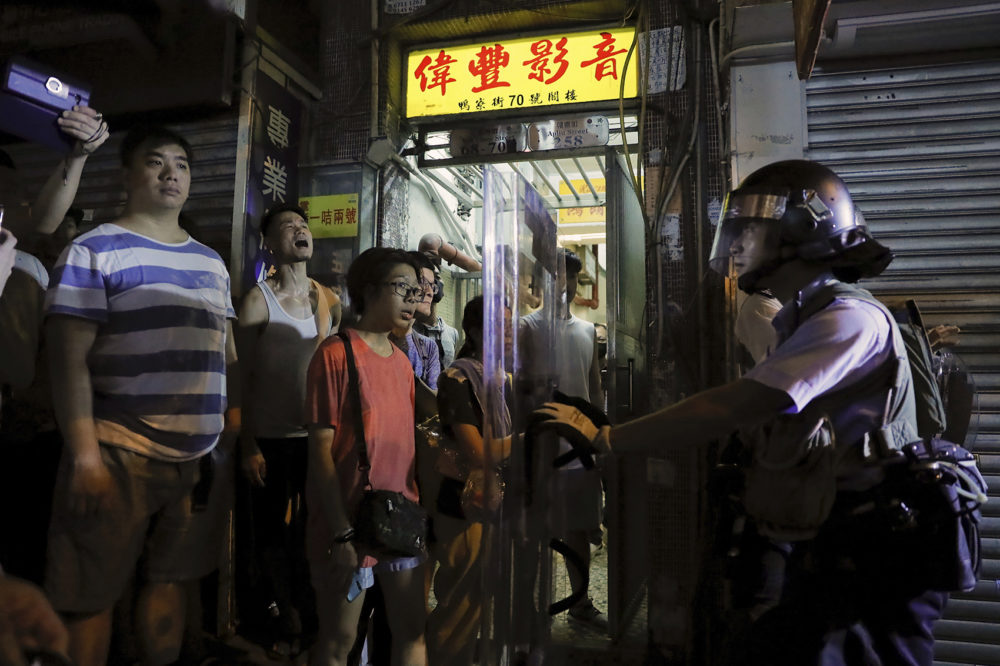Advertisement
Continuing Hong Kong Protests, Escalating Trade War With China

With Meghna Chakrabarti
We go to Hong Kong for the latest on the protests, and to Beijing as the trade war with Washington gets hotter and hotter.
Guests
Natasha Khan, Hong Kong correspondent for the Wall Street Journal. (@natashakhanhk)
David Rennie, Beijing bureau chief and Chaguan columnist for The Economist. (@DSORennie)
Robert Daly, director of the Kissinger Institute on China and the United States at the Wilson Center. Former U.S. diplomat in Beijing, he was an interpreter for Chinese and U.S. leaders. (@KissingerInst)
From The Reading List
Wall Street Journal: "China Claims U.S. ‘Black Hand’ Is Behind Hong Kong Protests" — "China ratcheted up its accusations of U.S. involvement in fomenting protests in Hong Kong, spotlighting a top diplomat in state media, as the restive city prepared for a 10th weekend of demonstrations under the threat that Beijing could step in.
"Hundreds of black-clad protesters began a three-day sit-in at the city’s international airport on Friday, while several demonstrations planned for the weekend were banned by the local police. That could give rise to further clashes, days after Beijing warned it could intervene directly if Hong Kong authorities were unable to quell the unrest on their own.
"The protests come amid rising trade tensions between the U.S. and Beijing. Chinese officials have accused the U.S. of encouraging protesters to undermine the government, though the Trump administration has offered guidance to officials to maintain a measured response in an effort to avoid derailing U.S. efforts on trade talks. U.S. diplomatic representatives in Hong Kong have met with senior government officials."
Asia Times: "Protesters to target HK airport starting on Friday" — "More protests and civil unrest are set to rock Hong Kong, starting on Friday at Hong Kong International Airport with a rally expected to last three days.
"According to information widely circulated online, protest organizers have called for a 'tourist reception by 10,000 protesters' at the Arrival Hall in Terminal 1 at the airport starting from 1pm on Friday.
"On Thursday, Washington issued a warning to US citizens to 'exercise increased caution' when traveling to Hong Kong as protest organizers announced three days of new demonstrations at the city’s airport.
"People joining this gathering have been advised not to vandalize or trespass in the restricted area. No one has filed an application for a Notification of Intention to hold a public meeting or procession under the law. However, police made a public appeal to do so during a police press briefing on Thursday."
The Economist: "Trade can no longer anchor America’s relationship with China" — "Since china emerged from the wreckage of Maoism 40 years ago, the profit motive has become a pillar of stability in its relations with America. Presidential candidates might accuse China of stealing jobs. Spy scandals could simmer. Then corporate bosses and politicians in Beijing and Washington would decide that all sides were making too much money to let relations sour. This focus on mutual self-interest involved queasy compromises. Soon after troops massacred hundreds, possibly thousands, around Tiananmen Square in June 1989, President George H.W. Bush wrote discreetly to Deng Xiaoping to urge joint efforts to prevent “tragic recent events” from harming relations. The financial crash of 2008 revealed a dangerous co-dependency between America the importer of cheap goods and China the thrifty exporter. New terms tried to capture this symbiosis: 'Chimerica', or 'the g2'.
"Suddenly, however, making money is not enough. In the past couple of years, debate about how to get engagement to work has given way to talk of strategic competition and security threats. Rather than catchy neologisms, scholars are reaching for historical analogies. Some talk of 1914, when clashing British and German ambitions swept aside deep bonds of commerce. China analysts obsess over the “Thucydides trap” that supposedly dooms upstart nations to fighting incumbent powers, as the Greek historian wrote of Sparta and Athens."
Stefano Kotsonis produced this hour for broadcast.
This program aired on August 12, 2019.